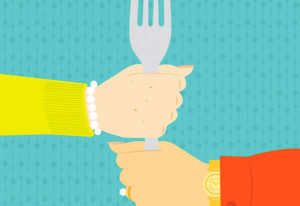 Michelle Konstantinovsky’s article, Why Adult Women Suffer from Eating Disorders, addresses the common misconception that eating disorders only affect teenagers. She discusses how a ground breaking 2012 study reported that thirteen percent of women, age fifty and over, displayed eating disorder symptoms. The women who participated in the study fell into three distinct categories: one group had developed eating disorders when they were adolescents, had recovered, then relapsed in their older years; another group developed eating disorders when they were young and never recovered; the final group developed eating disorders later in life. Despite these differences, all groups had one disturbing trait in common: many of their illnesses went unnoticed by their doctors. In fact, according to Konstantinovsky’s article, many women are complimented and even congratulated by their physicians about their weight loss. A lot of times, eating disorders can be overlooked because a person’s weight does not always dip dangerously low or cause emaciation. Additionally, in women of menopausal age, the common symptom of the loss of menses is not applicable. Unfortunately, a missed diagnosis can lead to long term health complications like bone loss and heart problems, says Konstantinovsky. The article also gives insight into some of the reasons why middle-aged women develop eating disorders:
Michelle Konstantinovsky’s article, Why Adult Women Suffer from Eating Disorders, addresses the common misconception that eating disorders only affect teenagers. She discusses how a ground breaking 2012 study reported that thirteen percent of women, age fifty and over, displayed eating disorder symptoms. The women who participated in the study fell into three distinct categories: one group had developed eating disorders when they were adolescents, had recovered, then relapsed in their older years; another group developed eating disorders when they were young and never recovered; the final group developed eating disorders later in life. Despite these differences, all groups had one disturbing trait in common: many of their illnesses went unnoticed by their doctors. In fact, according to Konstantinovsky’s article, many women are complimented and even congratulated by their physicians about their weight loss. A lot of times, eating disorders can be overlooked because a person’s weight does not always dip dangerously low or cause emaciation. Additionally, in women of menopausal age, the common symptom of the loss of menses is not applicable. Unfortunately, a missed diagnosis can lead to long term health complications like bone loss and heart problems, says Konstantinovsky. The article also gives insight into some of the reasons why middle-aged women develop eating disorders:
“When you enter a different chapter or encounter new hurdles – marriage, divorce, kids, empty nest, aging parents – your sense of self can become disorganized…the pressures women feel are further compounded by the prevailing societal mind-set that it is not okay to age…”
Konstantinovsky makes a point to discuss new treatment possibilities for adult women with eating disorders. Currently, it is common for women to end up in treatment with adolescents. However, clinics across the country have started programs geared specifically to women age thirty and up. This gives them the support they need for their particular illness, and provides them the opportunity to connect with other women who are in similar situations. Read the full article HERE.
Rosewood knows how isolating an eating disorder can be. You can feel cut off from the world, desperate, and frustrated. We are here to tell you that you are not the only one, and we can help! If you’re a grown woman struggling with anorexia, bulimia, or binge eating disorder, we have a treatment program that can help you. We offer personalized treatment, caring professionals, and flexible programming designed to support your journey to recovery. For more information call us 27/7 at +1 (800) 845-2211.
This post is a summary of an article from Oprah.com and does not include the opinions of Rosewood Centers for Eating Disorders or its affiliates. You can read the full article here.








